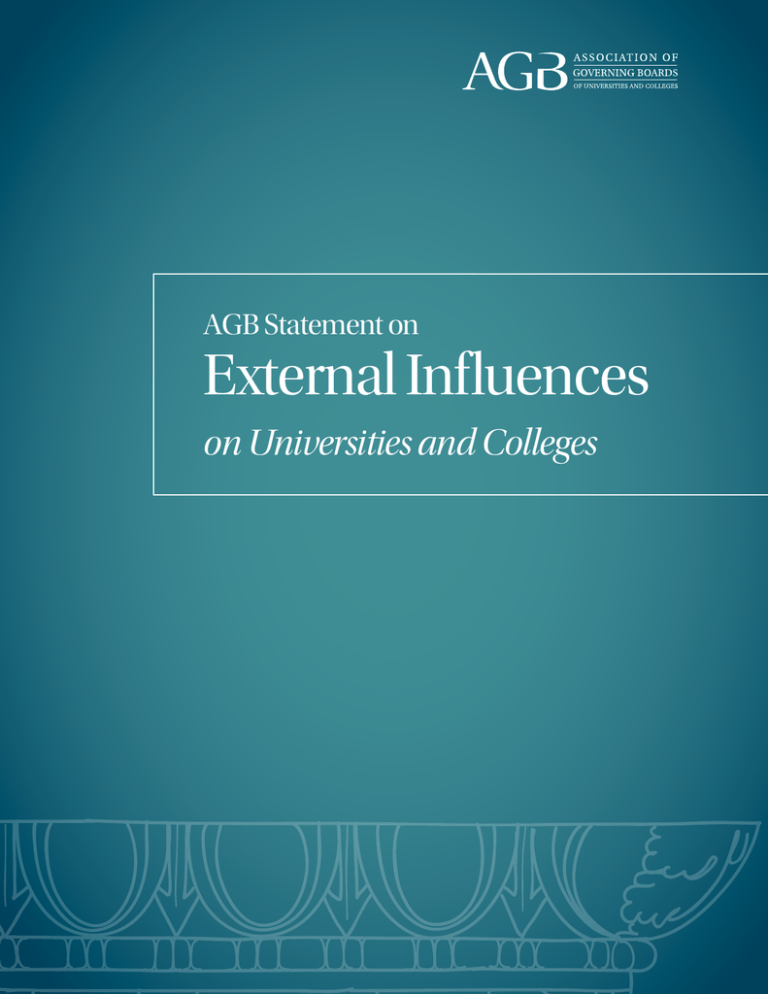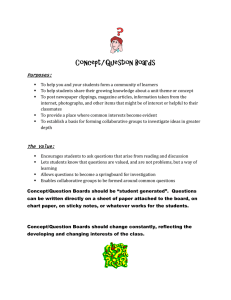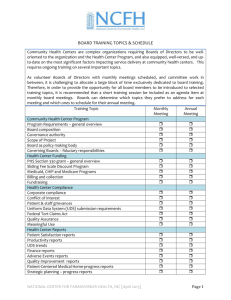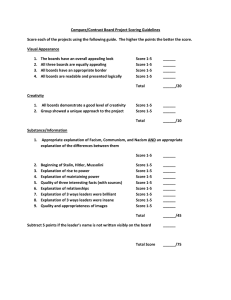
AGB Statement on
External Influences
on Universities and Colleges
This statement was approved on
August 17, 2012, by the Board of
Directors of the Association of
Governing Boards of Universities and
Colleges. The following principles
are intended to guide boards in the
governance of colleges, universities,
and systems, inform them of their
roles and responsibilities, and clarify
their relationships with presidents,
administration, faculty, and others
involved in the governance process.
© 2012 Association of Governing Boards
of Universities and Colleges
All rights reserved
A
s the country increasingly focuses on the
relationship between higher education
and our nation’s future, the responsibilities
associated with effective board governance
take on renewed emphasis. Serving as
a board member has never been easy. Yet with calls at
both the federal and state level for more transparency,
improved educational quality, accountability, increased
student access and attainment, and cost containment,
the responsibilities of boards are more complex and
challenging than ever.
AGB Statement on
External Influences
on Universities and Colleges
During the past decade, intrusions into the work of governing bodies have grown
significantly. Governors and legislators have attempted to direct governance actions,
regulators have tried to redefine board independence, state laws have increasingly
encroached upon independent decision making, donors and sponsors have sought to
determine institution policy, and a broadening array of organizations has continually
worked to influence board decision making.
As the overseers of a public trust, boards have an obligation to remain open to external
input and ensure the institutions they govern are responsive to societal needs. They have
the responsibility to link the colleges, universities, and systems they serve to the interests
of the public. Through this special responsibility, boards help their institutions and
systems meet public expectations and ensure a high degree of trust.
However, boards must also recognize that, in the end, their decision making must
rise above the external pressures being applied to their work. America’s unique higher
education governance model is dependent on boards consisting of independent men and
women acting together to be fully informed and impartial in their policy determinations,
and committed to the long-term well-being of the institutions they serve.
This statement, first issued by AGB’s board of directors in 2001, has been updated to
address increasing efforts to affect board independence from outside the boardrooms of
our institutions. It also serves as a reminder to the nation’s 50,000 board members that
theirs is a sacred trust that requires awareness, engagement, and independence.
1
The stakes are too high for boards to cede their policy authority, for which they
bear ultimate fiduciary responsibility, to governmental control or self-serving political,
economic, or personal interests external to the institution. Acting as the oversight body of
a public trust, boards should always bear in mind the following:
Although boards should respect, encourage, and welcome the
input of all stakeholders in considering a policy, they must
ensure that their decision making processes
are free of any undue pressures from external
stakeholders—from policy makers (including
1.Preserve institutional
appointing authorities and regulators), donors,
independence and
alumni and boosters, corporate sponsors, or
autonomy.
political-interest groups/organizations.
Boards have ultimate responsibility to sustain
higher education’s inherent values—academic
freedom, institutional autonomy, and selfregulation—and protect them from those
who attempt to leverage influence to affect
institutional policy.
Board independence is a basic requisite in
meeting the fiduciary standards of obedience
and loyalty that define a board’s legal
obligations.
Boards must use the mission of their institution
or system as the focal point for their policy
decisions, and public institution boards should
also be especially mindful of statewide policy
agendas as a framework for their actions.
2.Demonstrate board
independence to
govern established by
charter, state law, or
constitution.
3.Keep academic freedom
central and be the
standard bearer
for the due-process
protection of faculty,
staff, and students.
4.Assure institutional
accountability to the
public interest.
Individual board members whose views are
not consistent with board decisions must
respect the actions of the corporate body and
avoid putting their own interests before that of the institution.
Boards must police themselves in assuring the highest level of ethical behavior
among their members, including avoiding any board member assuming the role as an
advocate for a special interest in the outcome of a board’s decision.
2
This statement is comprised of four principles. It concludes with several illustrative
questions for governing boards to consider. The four principles are:
1. Preserve institutional independence and autonomy by:
keeping the mission as a beacon,
ensuring that philanthropy does not inappropriately influence institutional
independence and autonomy or skew academic programs or mission, and
ensuring that institutional policies governing corporate-sponsored research
and partnerships with the private sector are clear, up-to-date, and periodically
reviewed.
2. Demonstrate board independence to govern as established in charter, state law, or
constitution by:
ensuring the full board governs as a collective, corporate body taking into
consideration the need for individual members to apply their individual
consciences and judgments,
individual board members committing to the duties of care, loyalty, and
obedience as essential fiduciary responsibilities, and
basing the selection or appointment of board members on merit and their ability
to fulfill the responsibilities of the position.
3. Keep academic freedom central and be the standard bearer for the due-process
protection of faculty, staff, and students.
4. Assure institutional accountability to the public interest by:
serving as a bridge to the external community,
informing, advocating, and communicating on behalf of the institution, and
exhibiting exemplary public behavior.
Primarily intended for boards and their individual members, the statement’s
secondary audience is the several stakeholders external to the university. Their input into
board decision making is often essential and should always be respected, but it should
never be unwarranted or intrusive.
3
Principles on External Influences
The following four principles are organized around key themes for governing boards
and other academic leaders—and, in appropriate places, the external stakeholders of
universities and colleges—to thoughtfully consider.
1. Preserve institutional independence and autonomy.
Both private and public institutions need a high degree of independence and
autonomy from direct government control or any self-serving or political agenda. Because
of higher education’s unique mission to transmit and advance knowledge, colleges and
universities function at their best when teaching and scholarship are unencumbered by
unnecessary restrictions, preordained outcomes, or undue expectations or influences—
whether from government officials, donors, or any other individuals or groups.
The integrity of research findings and advancement of knowledge require free and
independent inquiry. When necessary, boards must be willing to take a strong stand in
defense of institutional autonomy and independence, providing a buffer between the
college or university and inappropriate outside intrusion or criticism. Boards should:
Keep the mission as a beacon.
A governing board should base its decisions on how the institution can best serve
the public trust by respecting the boundaries of the institution’s mission. Colleges and
universities are under frequent pressure from well-meaning interests and supportive
constituents to alter missions or offer new academic programs that may run counter to
their missions.
Ensure that philanthropy does not inappropriately influence institutional
independence and autonomy or skew academic programs or mission.
All colleges and universities are becoming increasingly dependent on gifts from
private donors, many of whom are demanding a greater say in not only the purposes
but also the uses of those gifts. Such an outcome-driven and collaborative approach
is the reality of contemporary philanthropy. Boards can help facilitate meaningful
and appropriate relationships with donors by calling for up-to-date gift-acceptance
policies and processes, as well as naming policies for buildings, research institutes and
centers, and the like. These policies and processes will preclude donors from exercising
inappropriate influence on the institution’s independence and autonomy or its academic
programs and mission. These policies and processes should apply to donors who are
members of the governing board as well as to donors external to the institution, no matter
how generous they may be.
4
Ensure that institutional policies governing corporate-sponsored research
and partnerships with the private sector are clear, up-to-date, and periodically
reviewed.
Colleges and universities engaged in research garner significant revenues from
corporate-sector research and development programs, which are encouraged by federal tax
laws and the needs of a competitive marketplace. Governing boards should make certain
that all institutional policies guiding research and partnerships with the corporate sector—
including technology transfer, licensing agreements, and ownership and dissemination of
research results—are clear, current, protect faculty, and serve the interests of the institution.
At the same time, those policies should be sufficiently flexible to enable new research
discoveries to enter the marketplace in a timely manner.
2. Demonstrate board independence to govern as established
in charter, state law, or constitution.
Within some practical and legal limits, the board’s authority is extensive—it is the legal
entity composed of citizens who are surrogates of the full citizenry, created and charged
to oversee the institution. Compared to their private college and university counterparts,
boards of public institutions face some constraints in founding statutes or subsequent
laws, but in nearly all areas, the authority of public and private college and university
boards is remarkably similar.
It is the board’s responsibility to exercise due diligence and trust in its own authority
and capacity to make decisions, some of which will be difficult or unpopular—especially
when internal and external stakeholders have competing demands. Despite the
importance—indeed the necessity—that a board garner and appreciate a rich array of
voices from its various communities, the distinction between advising and governing must
remain clear. The board that surrenders or compromises its independence to internal or
external claimants will see the erosion of its ability to govern fully and effectively.
The full board must govern as a collective, corporate body taking into
consideration the need for individual members to apply their individual
consciences and judgments.
A board with consistently agreeable members would be neither plausible nor in an
institution’s best interest; disagreements and tensions are inevitable in the boardroom.
Board members bring their own perspectives and opinions to decisions, but in the end,
the board governs as a body. Even when board members sharply disagree during the
deliberative process, once a decision has been made the board must always speak publicly
with one voice—particularly on issues with keen external stakeholder interest.
5
External pressures should not lead board members to respond to narrow interests
or single issues, nor to use their board position inappropriately to advance their
own personal goals, stature, or visibility. Doing so weakens the board and the citizen
trusteeship of the institution.
Individual board members must commit to the duties of care, loyalty, and
obedience as essential fiduciary responsibilities.
Board members’ fiduciary responsibilities go well beyond ensuring the fiscal health
of the college or university. The duty of care requires full attention to one’s duties as
trustee, setting aside competing personal or professional interests. The duty of loyalty
demands that board members put the interests of the institution before their own selfinterest and the interest of others. The duty of obedience refers to board members’
obligation to promote the mission of the organization, within legal limits. Knowledge
of and commitment to these duties, which are the cornerstone of governance and well
established in law and practice, can guide a board and its members in relationships to
external stakeholders.
The selection or appointment of board members should be based on merit and
their ability to fulfill the responsibilities of the position.
Governing boards should be composed of carefully selected, independent-minded
individuals who are fully committed to the college, university, or system they govern.
All trustees must hold the institution “in trust” for all citizens, regardless of how they are
selected and whether particular seats on the board are reserved for specific constituencies
(such as faculty members or alumni).
Board appointments and reappointments in both private and public colleges and
universities should be made based on a demonstrated commitment to serving the
institution, its mission, and its public purpose. Doing so ensures that the board and its
individual members can engage successfully with an array of external stakeholders,
constituents, and influences.
Governing boards of most private colleges and universities are self-perpetuating;
the board appoints members for most vacancies that occur. Selection should be guided
by a statement of expectations and clear criteria, including the ability and willingness
of the individual to use his or her best independent judgment on matters affecting the
institution, to make a broad commitment to higher education, and to commit the time
and energy necessary to fulfill the required responsibilities. Such expectations and criteria
should also apply to the many church-related institutions where many trustees are
appointed by denomination units or authorities.
6
The appointing authority in the vast majority of public colleges and universities—
governors (with legislatures confirming)—should base selection on merit and
commitment, not on political or partisan considerations. Criteria and expectations should
include, in addition to those for private board members, a demonstrated understanding of
the role of the institution or university system within the broader higher education system
of the state and an appreciation for the public nature of the position and the institution.
3. K
eep academic freedom central and be the standard bearer
for the due-process protection of faculty, staff, and
students.
Intellectual integrity and academic freedom are at the heart of the historic justification
for the self-governance of colleges and universities. Board members should be able
to explain academic freedom and be prepared to support and defend it on behalf
of their institutions and faculty members when external pressures, complaints, or
misunderstandings arise. At times, it may be necessary for the board to publicly declare
its support of faculty members and their right to unpopular or controversial ideas. The
protection of academic freedom should also extend to staff members and students where
appropriate.
At the same time, the board should ensure that academic freedom is not used as
a shield for inappropriate or unethical behavior. The disregard or abuse of academic
freedom corrodes respect for the governance of higher education and basic trust of the
academy. In the legitimate academic work of research, scholarship, and teaching and
learning, the board should see that protections of academic freedom through due-process
policies and procedures are in place.
4. ensure institutional accountability to the public interest.
When boards ensure that their institutions are accountable to the public interest, external
constituents and stakeholders will respect the board’s authority, see its value, and understand
its responsibility for the oversight of the institution and its future. The American people
entrust control of higher education institutions to citizen boards and to the independent
judgment of their members, rather than to public officials, ministries, or bureaucracies.
Governing boards, however, must earn and maintain the respect of external stakeholders,
including those in political power.
7
When it is perceived that societal and institutional interests diverge, it is the board’s
responsibility to help reconcile differences and ensure institutional accountability to
public purposes. Board oversight of educational quality must be a priority, not only to
address legitimate public concerns, but to ensure that the private interests of students—to
pursue meaningful degrees and credentials—are honored. Boards should:
Serve as a bridge to the external community.
Governing boards should be a conduit between the institution and the public. This
role means being attentive to the political, economic, social, and educational priorities of
the nation, state, region, or community and actively encouraging the institution to search
for solutions to society’s problems. It means working with the chief executive to maintain
a clear process for soliciting views from, and speaking to, such external stakeholders as
elected leaders, business groups, or the news media.
The governing board and the chief executive face a variety of demands and
expectations. But ultimately it is the board, by being a bridge to the community and
attuned to its needs, that must decide what can be changed or improved and what should
not, including any change in mission after careful deliberation.
Inform, advocate, and communicate on behalf of the institution.
A governing board has a responsibility to communicate the value of the institution to
the economic, social, and civic well-being of the community, state, or nation. While it is
usually the chief executive who speaks for the institution and the board chair who speaks
for the board, individual board members should take every opportunity to inform the
public about the good things that the institution is doing and why it deserves support.
A governing board must be careful never to endorse political candidates and be wise
and measured about making public statements or taking positions on community, state,
or national social and political issues that do not directly affect the institution. At the same
time, the board should encourage and sustain a campus environment that encourages
debate and diversity of opinion on such issues.
8
Exhibit exemplary public behavior.
Through their personal demeanor, public respect for civilized dialogue, and
commitment to board self-regulation, trustees should serve as models of public conduct
for the campus community and the community at-large.
Trustees often come to the board from different political, religious, and social
backgrounds, positions, or experiences, sometimes including election to their positions.
They must protect their colleges and universities from partisan influences so they in no
way become a distraction to the work of the institution or the board. All trustees have a
responsibility to guard against encroachment into their boardrooms of ideology that works
counter to ideas of mission, academic freedom, and fiduciary responsibility.
College and university boards must impose on themselves and those whom they
govern the strictest ethical behavior—at the very least observing all applicable laws and
regulations and being ready to exceed what the law demands. Board members must be
especially vigilant in regard to potential conflicts, actual and apparent, created by their
business and professional roles and personal relationships.
9
Illustrative Questions for Governing
Boards to Consider
What evidence suggests that the board functions efficiently and effectively as an
independent body?
Has the board defended institutional autonomy when such challenges have occurred?
Has the board defended academic freedom when such challenges have occurred? Have board
members been educated about the principles of academic freedom and do they understand
their obligation to defend it?
Do individual board members speak openly and freely during board meetings but support
majority decisions in the end?
Has the board identified the key issues coming from outside the university that could potentially
divide the board? Does the board have a positive board structure and culture to sustain
effectiveness, if and when such situations arise?
Does the board have a statement of expectations for its members, which includes language
about how individual members and the board relate to external constituents?
What policies and procedures does the board have in place to ensure that donors, including
private-sector partners and sponsors, are engaged appropriately?
Has the board’s capacity to fulfill its fiduciary responsibilities been impeded by external
influences such as government, corporate, political, social, or religious interests? Has the
legislature or governor recently intervened when it was determined that the board had not
acted decisively on an issue clearly within the board’s purview?
To what extent and in what ways have instances of partisan politics occurred in the boardroom
by a minority of its members? How has this adversely affected the work, cohesion, and culture
of the board?
Are members of the board able to articulate persuasively the public purposes of the institution?
What does the board do to publicly ensure accountability by the institution?
Does the board have policies or protocols for its individual members about speaking to the
press, elected leaders, donors, etc.? If so, have they been effective in reducing confusion,
conflicts, and misunderstandings with external stakeholders?
How comfortable is the board with the processes through which new members are identified and
vetted? To what extent are members identified on merit and their ability to serve as board members?
How does the board serve as an effective bridge to the external community? Through what
mechanisms does the board identify potentially meaningful changes and trends in the
external environment?
How does the board monitor is own conflict-of-interest policies and procedures?
11
AGB Board of Directors
Chair
Honorable Jim E. Geringer
Western Governors University
Andrea J. Loughry
University of Tennessee Foundation, Inc.
Charles H. McTier
Emory University
Vice Chair
Yvonne R. Jackson
Simmons College
David W. Miles
Iowa Board of Regents
Vice Chair
Honorable Jack B. Jewett
University of Arizona Foundation
James J. Mitchell, III
Roosevelt University
Charles R. Pruitt
University of Wisconsin System
Secretary
Clifford M. Kendall
University System of Maryland Foundation
University of Maryland College Park Foundation
David H. Roberts
Thunderbird School of Global Management
Occidental College
Elizabeth A. Ballantine
American University of Paris
Grinnell College, life trustee
Joyce M. Roché
Dillard University
Richard A. Beyer
American University
Verne O. Sedlacek
Public Member
Rita J. Bornstein
Public Member
Charles A. Shorter
City University of New York
James M. Fallows
Public Member
James C. Stalder
Carnegie Mellon University
Helen Aguirre Ferré
Miami Dade College
James M. Weaver
Gettysburg College, former board chair
Marilyn French Hubbard
Central Michigan University
Jacqueline F. Woods
Kent State University
Muskingum College
W. Austin Ligon
St. John’s College
Our Mission
The Association of Governing Boards of Universities and Colleges strengthens and
protects this country’s unique form of institutional governance through its research,
services, and advocacy. AGB is committed to citizen trusteeship of American higher
education. For more information, visit www.agb.org.
13
1133 20th St. N.W., Suite 300 • Washington, D.C. 20036
www.agb.org





